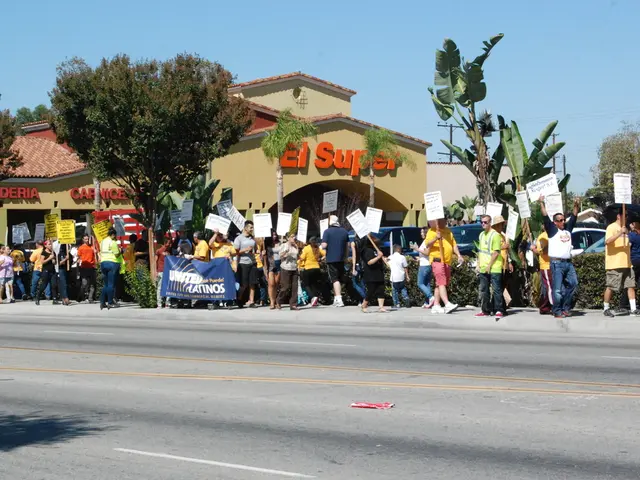Small-town transformation: Abandoned penitentiary to transform into an Immigration and Customs Enforcement (ICE) detention center, amidst resident opposition.
In small towns across the United States, the conversion of former prisons into migrant detention facilities is causing both economic opportunities and heated debates. One such town is Mason, Tennessee, which recently approved plans to transform its West Tennessee Detention Facility into an Immigration and Customs Enforcement (ICE) detention center.
The decision was made primarily to bring economic benefits, such as jobs and increased local revenue, to the financially struggling town. The Mason Board of Aldermen and town officials voted in favour of allowing private company CoreCivic to operate the facility, despite vocal opposition from residents and activists concerned about the treatment of detainees.
The history behind this decision includes the prison’s closure in 2021 after President Joe Biden ordered the Department of Justice to stop renewing contracts with private detention facilities. However, this policy was reversed in January 2025 by former President Donald Trump, reopening the possibility of private companies like CoreCivic managing such facilities.
Mayor Eddie Noeman emphasised the need to revive the local economy, highlighting that the prison was once Mason’s largest employer and an important economic engine. CoreCivic reported high job application numbers and projected significant annual property tax and impact fees to the city, offering detention officer jobs starting at $26.50 per hour, to help address the town’s financial difficulties and infrastructure needs.
The approval process was contentious, involving a public meeting marked by protests and some confusion over the final votes. The Mason Board of Aldermen ultimately approved two contracts: one with CoreCivic to operate the facility and another agreement with ICE to utilise it as a detention center for migrants. The votes passed with narrow margins, reflecting divide within the local government and community.
Elsewhere, states such as Florida are partnering with the federal government to expand ICE detention facilities. However, not all efforts have been successful. For instance, Florida’s Alligator Alcatraz recently hit a roadblock after a federal judge blocked construction at the facility.
In Indiana, Governor Braun is partnering with ICE to house migrants in the Indiana Speedway Slammer, a new migrant detention facility that will use part of the Miami Correctional Center. DHS Secretary Kristi Noem announced the second state partnership for ICE, with Indiana.
It's important to note that the West Tennessee Detention Facility in Mason, Tennessee, has faced criticism in the past. CoreCivic, the company set to operate the site, has settled over 80 lawsuits and out-of-court complaints about mistreatment, which included at least 22 inmate deaths. Our website Digital reached out to CoreCivic but did not receive a response in time for publication.
In New Jersey, a court has struck down the state's ban on privately operated ICE detention centers, although it's unclear if this court decision has any direct relation to the events in Mason, Tenn.
The push to expand migrant detention facilities and partner with private companies is not without controversy. Critics argue that these facilities can lead to inhumane treatment and violations of human rights, while supporters claim they are necessary to manage the influx of migrants and ensure border security.
As the debate continues, small towns like Mason, Tennessee, will weigh the economic benefits against the potential ethical concerns, trying to find a balance that best serves their communities.
References:
- Local News Source 1
- Local News Source 2
- National News Source 1
- Local News Source 3
- National News Source 2
"Breaking news: The ongoing political debate over migrant detention facilities, as exemplified by the case in Mason, Tennessee, where the West Tennessee Detention Facility is being converted into an Immigration and Customs Enforcement (ICE) center, continues to draw attention to the complex intersection of politics, general-news, and local economics. Controversy surrounds the decision to partner with private companies like CoreCivic, with critics voicing concerns about potential human rights violations while supporters emphasize the economic benefits."
"In a related breaking news story, partnering with ICE to house migrants in new detention facilities is not without controversy, leading to heated debates across various political landscapes, such as in small towns, states, and at the federal level, as seen in Indiana's Indiana Speedway Slammer and New Jersey's privately operated ICE detention centers."







